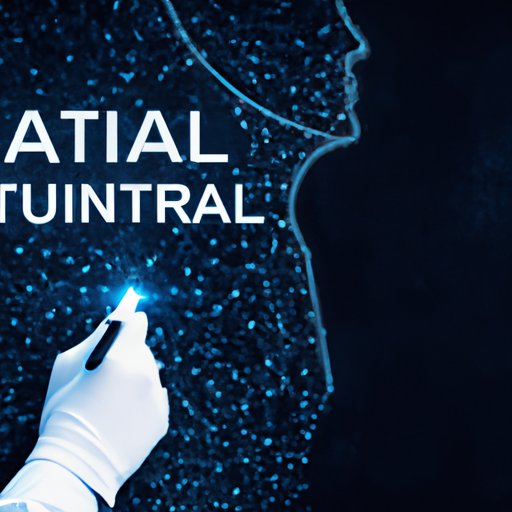Introduction
Artificial intelligence (AI) is rapidly changing how we interact with the world. As technology continues to evolve, AI is becoming increasingly capable of automating mundane tasks and performing complex processes that were once thought impossible. While AI has the potential to increase efficiency and reduce costs, it also has the power to fundamentally rewire our lives in ways that are both beneficial and potentially concerning. This article examines the potential for AI to transform human behavior, discussing the ethical implications of AI-driven decision making, the benefits and drawbacks of automation, and the impact of AI on employment and education.
Exploring the Potential of AI to Transform Human Behavior
As AI continues to become more advanced, it has the potential to reshape how humans think, act, and interact with one another. AI can be used to improve decision making, automate mundane tasks, and create new forms of communication that were once thought unimaginable. However, it also raises questions about how AI will affect our understanding of human nature and the way we interact with each other.
How AI is Changing Our Understanding of Human Nature
AI is challenging traditional notions of human nature by providing an alternative form of intelligence that is not limited by physical or biological constraints. According to Professor John Havens, executive director of the IEEE Global Initiative on Ethics of Autonomous and Intelligent Systems, “AI is a technology that allows us to think beyond what’s possible in terms of how we understand ourselves and our environment. It gives us the ability to explore new realms of knowledge and creativity and to redefine the human experience.”
The Impact of AI on Human Interaction and Communication
AI is also having an impact on how humans interact and communicate with one another. For example, AI-powered chatbots and automated customer service systems are making it easier for businesses to provide personalized customer service experiences. AI is also being used to create virtual assistants that can help users manage their daily tasks and schedules. Additionally, AI is being used to develop facial recognition software that can identify individuals from a distance and automate security procedures.
Ethical Implications of AI-Driven Decision Making
As AI becomes more sophisticated, it raises questions about the ethical implications of using this technology for decision making. AI-driven decisions can have far-reaching consequences and there is concern that these decisions may not always be in the best interest of the people they affect. As Professor Havens notes, “We must ensure that AI is designed with ethical considerations in mind, so that it is used responsibly and fairly. We need to consider the implications of AI-driven decisions on individuals, communities, and societies as a whole.”
Assessing the Benefits and Drawbacks of AI-Driven Automation
AI-driven automation has the potential to revolutionize the way we work and live. However, it is important to consider both the advantages and disadvantages of this technology before implementing it.
Advantages of AI-Driven Automation
AI-driven automation can save time and money by streamlining processes and reducing human error. Automation can also help make workplaces more efficient by eliminating tedious manual tasks. Additionally, AI-driven automation can be used to increase safety in hazardous environments by removing humans from potentially dangerous situations.
Disadvantages of AI-Driven Automation
While AI-driven automation has its advantages, there are also some potential drawbacks. For example, automation can lead to job losses as machines take over roles that were previously done by humans. Additionally, automation can create a disconnect between humans and machines, leading to a lack of understanding of how the system works and potentially creating a risk of manipulation or misuse.

Analyzing the Impact of AI on Human Employment and Education
AI is also having an impact on human employment and education. As AI continues to evolve, it is creating both opportunities and challenges for workers and students alike.
Employment Opportunities and Challenges Posed by AI
AI is creating new opportunities for workers by automating mundane tasks and freeing up employees to focus on higher-value activities. However, it is also creating challenges as jobs that were once done by humans are now being replaced by machines. According to Dr. Steve Omohundro, professor at Stanford University, “We need to be thoughtful about how to use AI to create new jobs and to retrain existing workers for the new AI-enabled economy.”
Educational Implications of AI
AI is also having an impact on education. AI-driven technologies can be used to automate teaching and learning processes, allowing educators to focus on more creative and interactive approaches to teaching. Additionally, AI can be used to personalize learning experiences and provide students with real-time feedback and support. However, there are also concerns that AI could lead to a decrease in creativity and critical thinking skills if it is overused in the classroom.
Conclusion
AI is rapidly changing the way we interact with the world, offering the potential to automate mundane tasks, improve decision making, and create new forms of communication. However, it is important to consider both the advantages and disadvantages of AI-driven automation before implementing it. Additionally, AI is having an impact on human employment and education, creating both opportunities and challenges for workers and students alike. Ultimately, it is essential that we continue to research and discuss the ethical implications of AI-driven decision making and the potential impacts of this technology on human behavior.
(Note: Is this article not meeting your expectations? Do you have knowledge or insights to share? Unlock new opportunities and expand your reach by joining our authors team. Click Registration to join us and share your expertise with our readers.)
